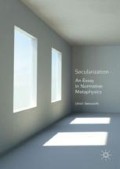Abstract
I consider authenticity a universal value, while Lionel Trilling (1971) and Taylor (2007:299) ascribe to its importance as a modern secular value. True, authenticity shows its full importance only in secular conditions, but to fully understand it we shouldn’t renounce considering premodern evidence for its importance.
Access this chapter
Tax calculation will be finalised at checkout
Purchases are for personal use only
Notes
- 1.
The inclination to classify phenomena associated with the self as typical of modern times has weakened in the last decades. Toohey (2007) is remarkable for demonstrating “the comparability” of the experience of the self “between its ancient and modern literary expressions” (2).
- 2.
Here is a translation by A.C. Graham of Zhuangzi’s Chapter 3 of his Inner Chapters:
Cook Ting was carving an ox for Lord Wen-hui. As his hand slapped, shoulder lunged, foot stamped, knee crooked, with a hiss! with a thud! the brandished blade as it sliced never missed the rhythm, now in time with the Mulberry Forest dance, now with an orchestra playing the Ching-shou. “Oh, excellent!” said Lord Wen-hui. “That skill should attain such heights!”—“What your servant cares about is the Way, I have left skill behind me. When I first began to carve oxen, I saw nothing but oxen wherever I looked. Three years more and I never saw an ox as a whole. Nowadays I am in touch with the daemonic in me, and do not look with the eye. With the senses I know where to stop, the daemonic I desire to run its course. I rely on Heaven’s structuring, cleave along the main seams, let myself be guided by the main cavities, go by what is inherently so. A ligament or tendon I never touch, not to mention solid bone. A good cook changes his chopper once a year, because he hacks. A common cook changes it once a month, because he smashes. Now I have had this chopper for nineteen years, and have taken apart several thousand oxen, but the edge is as though it were fresh from the grindstone. At that joint there is an interval, and the chopper’s edge has no thickness; if you insert what has no thickness where there is an interval, then, what more could you ask, of course there is ample room to move the edge about. That’s why after nineteen years the edge of my chopper is as though it were fresh from the grindstone. “However, whenever I come to something intricate, I see where it will be hard to handle and cautiously prepare myself, my gaze settles on it, action slows down for it, you scarcely see the flick of the chopper—and at one stroke the tangle has been unravelled, as a clod crumbles to the ground. I stand chopper in hand, look proudly round at everyone, dawdle to enjoy the triumph until I’m quite satisfied, then clean the chopper and put it away.”—“Excellent!” said Lord Wen-hui. “Listening to the words of Cook Ting, I have learned from them how to nurture life.”
Michael Puett comments this story instructively in a lecture given at Harvard University published at youtube in Dec. 2013; http://www.youtube.com/watch?v=4wOtPOo_vlM. Puett, though, doesn’t talk of authenticity.
- 3.
Cp. Patterson (1991:x): “China was exceptional among non-Western societies in recognizing a need at all for this … concept” of liberty that seemed to most other civilizations “odd” and “unnecessary.” In fact, Zhuangzi 9.60-61, in its story about the wild horses, has provided a unique image and most passionate defense of liberty.
- 4.
K.A. Neuhausen confirmed my interpretation of Cicero in provte correspondence. Steiner (1984:242), says “antique sensibility very definitely attaches to suicide an aura of the feminine.” If so, this is another reason to find authenticity in Cato’s suicide, as Cato didn’t shrink back from this aura. But suicide was also considered a duty after military or moral defeat or slanders impossible to repel in many warrior societies.
- 5.
Unlike his models Augustine and Montaigne, Rousseau wrote his Confessions as a dialogue not with God or with himself but with a public that he wanted to judge him positively. As this intention sets an extrinsic goal to his Confessions, it was hardly favorable to being authentic.
References
Burckhardt, Jacob. The Civilisation of the Renaissance in Italy (1860), London: Folio Soc. 2004.
Fine, Gary. Kitchens: The Culture of Restaurant Work, Chicago: University of Chicago Press 1998.
Marx, Karl. Ökonomisch-philosophische Manuskripte von 1844, Marx/Engels, Gesamtausgabe Abt.1, Bd. 3, Berlin: Dietz 1982, tr. M. Milligan, Moscow: Progress Publishers 1959, online ed. www.marxists.org.
Nietzsche, Friedrich. Human All Too Human (1878), Mineola: Dover 2006, tr. Helen Zimmern.
Patterson, Orlando. Freedom. Vol. 1: Freedom in the Making of Western Culture, New York: Basic Books 1991.
Plutarch, Parallel Lives, Loeb Classical Library vol. VIII, Cambridge/Ma: Harvard UP 1919.
Sorabji, Richard. Self. Ancient and Modern Insights about Individuality, Life and Death, Chicago: The University of Chicago Press. 2006.
Steiner, George. Antigones, New Haven: Yale UP 1984.
Steinvorth, Ulrich. Pride and Authenticity, New York: Palgrave Macmillan 2016.
Taylor, Charles. A Secular Age, Cambridge/MA: Harvard UP 2007.
Toohey, Peter. Melancholy, Love, and Time. Boundaries of the Self in Ancient Literature, Ann Arbor: University of Michigan Press 2007.
Trilling, Lionel. Sincerity and Authenticity, Cambridge/Ma: Harvard UP 1971.
Vannini Phillip and Sarah Burgess. “Authenticity as Motivation and Aesthetic Experience”, in Vannini and Williams 2009: 103–119.
Zhuangzi. The Essential Writings with selections from traditional commentaries, tr. Brook Ziporyn, Indianapolis: Hackett 2009.
Author information
Authors and Affiliations
Corresponding author
Rights and permissions
Copyright information
© 2017 The Author(s)
About this chapter
Cite this chapter
Steinvorth, U. (2017). Authenticity in Ancient China, Rome, the Renaissance, and Marx. In: Secularization. Palgrave Macmillan, Cham. https://doi.org/10.1007/978-3-319-63871-3_6
Download citation
DOI: https://doi.org/10.1007/978-3-319-63871-3_6
Published:
Publisher Name: Palgrave Macmillan, Cham
Print ISBN: 978-3-319-63870-6
Online ISBN: 978-3-319-63871-3
eBook Packages: Religion and PhilosophyPhilosophy and Religion (R0)

